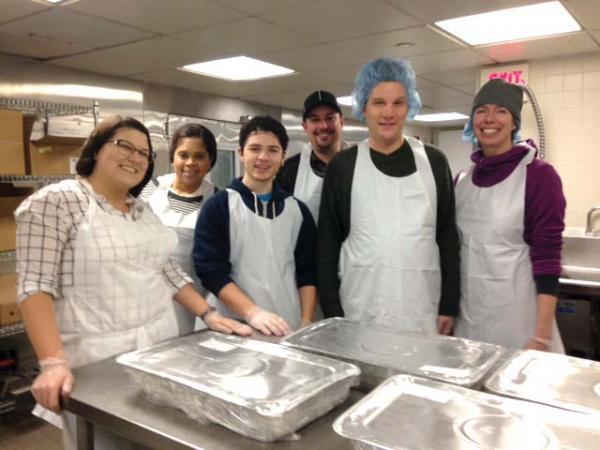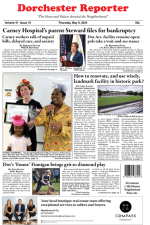June 15, 2017

Rhianna Wegner, Dionne Smith, Edan Mejias, Shane Conti, Brian Kopitsky, and Julie Wright in the UMass Boston Campus Kitchen. Image courtesy UMB
A student-driven program at UMass Boston is helping to feed hundreds of hungry people in Dorchester throughout the year by repurposing leftover food to minimize waste while providing nutritious meals to the community.
The Kitchen at UMass prepares and serves about 200 meals a week during the school year, and 500 a week during the summer. “Campus Kitchens are about meeting the gap between the community inside the college and the wider neighborhood community and providing the resources and nutrients that they need,” said Rebecca Driscoll, the program coordinator at the UMass Boston site.
The program shares a unique connection with the Harbor Point community, where the students themselves deliver, prepare, and sometimes eat lunch meals with older adults who would otherwise struggle to get groceries without special transportation or be left to prepare food for themselves.
Since January of 2017, 236 volunteers have contributed 640 volunteer hours and 8,506 pounds of food have been recovered and transformed into 4,785 meals served around Dorchester, including to kids at the St. Peter’s Teen Center in Dorchester, the Walter Denney Youth Center (Boys and Girls Club of Dorchester), Hearty Meals for all in Somerville, and the Vinfen Organization for adult residents with disabilities. The program also has three summer camps to work with, the Talented and Gifted Program, Project Alerta, and Project Reach, where they serve snacks and lunches, and provide nutrition education classes for interested students.
Most of their food sites are accessible to people who can use campus shuttles or the T. Otherwise, partners farther from UMass Boston pick up and distribute food shipments with delivery trucks.
The number of meals served from the UMass site spikes in the summer since many kids who would typically get free and reduced lunches during the school year rely on summer camps for access to food during the summer.
Launched in 2010, the program taps into the desire of many UMass students looking for community service opportunities who also have a strong interest in reducing food waste. Student volunteers are the main ingredient to the Kitchen’s success; they plan the menus, get the food, run the cooking shifts, organize the drivers, and teach culinary skills to other students and adults. They also help to keep track of all of the paperwork, organize fundraisers, develop curriculum, and recruit new students to get involved.
“It’s been really neat especially to see student volunteers who live in the Boston community connect with other people who live in the Boston community that they haven’t known or met before,” said Driscoll.
“Many of the [Harbor Point] residents that we serve are older adults and the students are young, from 15 to mid 20s; and that intergenerational connection is great to see. It’s really rewarding for both the students and the older adults that don’t really leave their homes.”
The Kitchen’s food is provided mainly by Sodexo, which is the food service provider for the UMass Boston cafeteria system. The Kitchen also has a partnership with Whole Foods and the Food for Free organization in Cambridge, both of which provide fresh produce to balance out the nutrition within meals.
The UMass Boston efforts is part of a wider network known as the Campus Kitchen Project which was founded in 1989 by Robert Egger, who developed the model from his own successful local community kitchen, the DC Central Kitchen. With its headquarters still in D.C., the Campus Kitchen Project has grown to establish 60 sites across the country, serving from the cafeteria kitchens of various colleges and universities.


